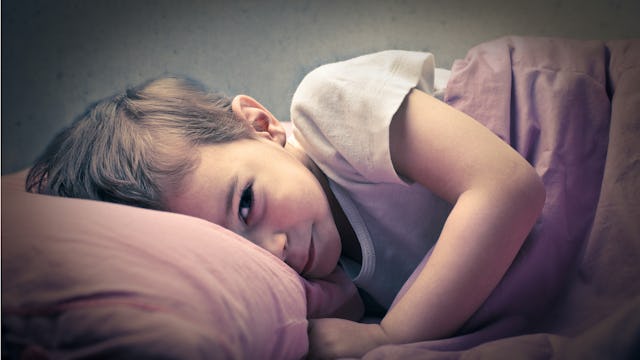No Matter How Hard We Try, Some Kids Are Just Night Owls

It’s 10:30 p.m. and my daughter gets up to go to the bathroom. As she turns on the bathroom light, my son calls from his room, “Mommy? What time are we going to the park tomorrow?” Both kids went to bed two hours ago. They’ve been in bed this whole time, but neither has fallen asleep yet. And they probably won’t for another 30–60 minutes.
Our two youngest kids are night owls. At 13 and 8, they almost always stay up as late as my husband and I. Or rather, they stay awake as late as we do, which is usually 10:30 or 11:00. They go to bed at a reasonable hour, usually between 8:30 and 9:00, but their minds and/or bodies simply aren’t ready for bed.
We’ve tried all kinds of methods to get them to fall asleep earlier over the years. We’ve always had a pretty solid, consistent bedtime routine, so that’s not the issue. We make sure they get plenty of hard physical play and fresh air during the day. We limit screen time and implemented a “no screens after dinner” rule to prevent the blue light from LED screens from messing with their circadian rhythms. We’ve tried earlier bedtimes and later bedtimes. We’ve tried waking them up really early. We’ve tried guided sleep meditations, soothing music, audiobooks, and silence. We make sure their room is dark.
But none of that makes a difference for them. The only thing we’ve tried that reliably works to help them fall asleep quickly is a small dose (1 mg) of melatonin. We don’t feel good about using melatonin long-term, though, as the research isn’t conclusive about how it might affect their hormonal development. We do use it occasionally, with the blessing of our pediatrician, when we know they’ll need to be up early for something. But otherwise, we let their bodies do what they do.
We’re lucky that we homeschool, so we can allow them to do that. It’s rare that the kids have to be up very early, so they do still get the amount of sleep they need. They just sleep from 11 p.m. to 8:30–9 a.m. rather than 9 p.m. to 6:30–7 a.m. If they were in school, I’m not sure what we’d do.
We didn’t expect to be in this boat. Our first child was very much an early-to-bed, early-to-rise kid. As babies and toddlers, our younger two would go to bed early, but as the years went on, their wakefulness at bedtime did too. Our pediatrician said that some people just have a naturally later sleep cycle.
I blame my husband — he says he remembers lying awake for hours as a kid. He’s shifted from burning the midnight oil when we first got married to having a more middle-of-the-road sleep schedule 19 years later, but when he was young, he was definitely a night owl. I was always a lark, so I have a hard time relating.
It’s not exactly ideal in my mind to have the kids go to sleep so late either. I treasure my after-hours time in the evening to decompress while the munchkins are asleep. But now that our eldest is a teen, she also has a later sleep schedule, so I just use the morning as my alone/recharge time. I spent far too long fighting my kids’ natural rhythms. Once we tried all the tips for helping them fall asleep to no avail, we decided to just embrace it. We still have them get into bed at a reasonable bedtime, but we don’t fret over them falling asleep. They always fall asleep eventually.
Our pediatrician said as long as they are basically going to sleep around the same time each night and are getting a full night’s sleep, having a shifted sleep schedule isn’t intrinsically problematic. And I’ve seen how our oldest kid’s sleep schedule has changed as she’s gotten older, so I’m not going to worry about it. We’ve taken the “if it ain’t broke, don’t fix it” approach to our kids’ dozeless evenings.
After the years of sleep deprivation during our kids’ baby and toddler years, I’m just happy that everyone sleeps through the night. That night might start later for our kids, but if everyone is happy and healthy, why not?
This article was originally published on